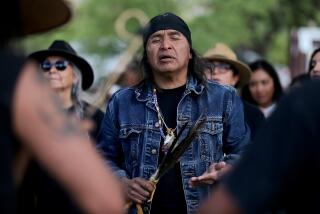U.S. rejects proposed coal export facility, siding with one Indian tribe over another
- Share via
Reporting from Seattle — The federal government dealt a fatal blow on Monday to a proposed coal export facility in Washington state that pitted two Indian tribes against each other — one that wanted to export coal to Asia, another that argued the facility would damage its historic fishing grounds.
In the end, the Lummi Nation prevailed based on its 1855 treaty with the federal government, which guaranteed the tribe the rights to its “usual and accustomed” fishing grounds in the Salish Sea.
The small tribe won at the expense of the Crow tribe of eastern Montana, which has an agreement with a mining company, Cloud Peak Energy, to develop a coal mine on its 2.2-million-acre reservation. The Crow, poor and geographically isolated, contended that the mine and the terminal to export coal overseas were essential to the tribe’s economic survival.
The proposed port stood to be the largest coal export facility on the West Coast. Known as Gateway Pacific Terminal, it was to be built at Cherry Point, an area zoned for industrial development just north of Bellingham, Wash. The Lummi, in addition to arguing that its fishing grounds would be hurt, said the area included sacred sites and the remains of tribal members.
The Army Corps of Engineers reviewed thousands of pages of documents and found that the terminal’s effect on Lummi fishing rights would exceed the relatively low threshold of damage that is allowed under the treaty, according to Col. John Buck, the corps’ Seattle district commander.
Tim Ballew II, the chairman of the Lummi, called the decision “a historic victory for treaty rights and the constitution” that “protects our sacred site.”
“Our ancient ones at Xwe’chieXen, Cherry Point, will rest protected,” he said.
Environmental groups also hailed the decision. They said the terminal and the trains that would have supplied it would have increased local pollution as well as carbon emissions in Asia that contribute to climate change.
A spokesman for the Crow did not immediately respond to a request for comment.
The proposed terminal became a flashpoint in the debate over coal exports in the West, which have typically involved mining interests inland and more liberal areas on the coast. Environmental groups helped galvanize tribal opposition, prompting the Crow to accuse the Lummi of being manipulated.
The Lummi, however, have become increasingly prosperous with a growing casino and a new hotel that have given them more resources to devote to preserving their culture.
Cloud Peak was “very disappointed” with the corps’ decision, its chief executive, Colin Marshall, said. The Cherry Point terminal “has been subjected to an unprecedented parallel process imposed by the corps that served to pick winners and losers among Native American tribes with differing interests in the project,” he said.
The company, which is based in Gillette, Wyo., still intends to develop the mine on the Crow reservation, but it and the tribe face questions about whether they will receive necessary federal permits. Cloud Peak already holds the rights to export coal from an existing terminal in British Columbia and a proposed one in Longview, Wash., a spokesman said in an email.
Opponents are fighting coal exports at those locations.
The coal industry in general has been struggling, as declining demand in the United States and Asia has driven down prices. The nation’s largest mining companies, including Arch Coal and Peabody Energy, have declared bankruptcy.
Cloud Peak has seen its stock plunge in the last two years and was trading at less than $2 per share at the close of business on Monday.
Last month, Marshall said in an earnings call that the coal industry had “permanently changed” because of the rise of cheap natural gas and greater interest in renewable energy.
ALSO
Obama administration clashes with North Carolina over state’s ‘bathroom law’
Where Beyonce, Black Lives Matter and global history collide: The ‘Black Power’ salute at West Point
How a freshman Republican senator became one of Donald Trump’s most outspoken critics in Washington
More to Read
Sign up for Essential California
The most important California stories and recommendations in your inbox every morning.
You may occasionally receive promotional content from the Los Angeles Times.











